|
 Secure Site
Secure Site
|
 |
Archive for the 'Now & Zen Alarm Clocks' Category
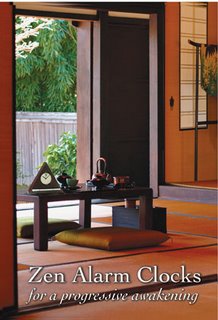 Feng Shui accessories for any room by Now & Zen, Boulder, CO Feng Shui – The Art of Placement
Now & Zen makes a unique line of sophisticated products that support the lifestyle of Feng Shui practitioners and their clients.
Our beautiful Zen Alarm Clocks, designed with spirit in mind in every detail, are excellent accessories for any room. And in addition to their decorative potential, they also provide a wonderful way to wakeup in the morning — with gradually-increasing Tibetan bell-like chimes.
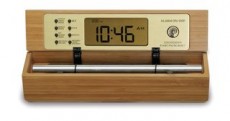 Bamboo Digital Zen Clock Our Digital Zen Alarm Clocks take the concept of a Tibetan bell clock further by adding a countdown timer and interval timer feature that allows the clock to be used as a tool for practices such as yoga, bodywork, and meditation.
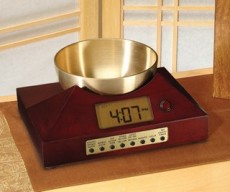 Zen Timepiece with brass bowl The Zen Timepiece® is a clock and timer that has a brass bowl integrated into the design. The Zen Timepiece includes a “mindfulness chime” feature that can be set to strike on the hour. Our complete line of products has been used by Feng Shui practitioners to help improve environments. Once you wake up to the beautiful sounds of a Zen Alarm Clock®, nothing else will do!
Now & Zen’s Clock Store
1638 Pearl Street
Boulder, CO 80302
(800) 779-6383
Posted in Japanese Inspired Zen Clocks, Now & Zen Alarm Clocks
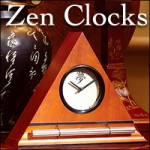 Zen Clocks by Now & Zen, Inc. Looking for the perfect desk clock gift and feeling a bit overwhelmed at all the options? Here are a few tips to consider when finding a desk clock gift for the special professional in your life.
(1) Desk Clock Gift Tip # 1: Does it look professional?
When picking out that perfect desk clock gift, your friend/loved one will really appreciate you taking the extra time to find one that maintains their professional image. One thing to consider is the material: clocks made out of nicer materials, such as wood or metal, typically make nicer gifts. Another concept that is important is the aesthetic features of the clock and if it blends with the current décor in the office. For example, our Zen alarm clock <link> is great for someone trying to have a very natural or organic feel in their office.
(2) Desk Clock Gift Tip # 2: How does it sound?
Nothing, and I mean absolutely nothing, is more annoying than the regular tick-tick-tick-tick from the second hand on typical desk clocks. When you are selecting a great desk clock gift, it is important to consider those annoying little sounds that a lot of clocks can make. What you don’t want to do is spend a lot of time and money on getting the perfect clock, just to find out a month later the recipient had to take the batteries out so it wouldn’t tick all of the time.
(3) Desk Clock Gift Tip # 3: Is it a timer?
A lot of highly-efficient professionals use timers to maintain good time management. A great feature for a desk clock gift is a timer function. Can you set it to ring in 30 minutes from now? Can you have it ring in regular intervals or on the hour, so the recipient of your gift can keep audio track of the time? These additional features can go a long way in helping your friend/loved one get the maximum amount of use from your gift.
(4) Desk Clock Gift Tip # 4: Don’t be the running Office Joke
A lot of more expensive, experiential clocks come with a large number of unnecessary bells and whistles. You can get lights that slowly turn on to simulate the dawn, little scented beads on the top of a clock, or the ability for a clock to go down 20,000 feet under water. Just remember, sometimes more is not better- it’s just more. Simple, classic, great-sounding clocks typically make the best gifts for the office. You don’t want the gift you worked so hard to pick out to become the running joke in the office because it dumped little scented beads all over the floor.
There are a lot of great options to consider when you are trying to find the perfect desk clock gift. Feel free to browse our clocks on our website at www.now-zen.com. Each one of the clocks is handmade from high-quality materials, and is its own acoustical instrument to ensure every sound is natural & calming.
Desk clock gift – Tips for find the professional in you your life a great clock for their desk:Looking for the perfect desk clock gift and feeling a bit overwhelmed at all the options? Here are a few tips to consider when finding a desk clock gift for the special professional in your life.
 Desk Clock Gift Store - Boulder, CO Now & Zen’s Alarm Clock Store
1638 Pearl Street
Boulder, CO 80302
(800 779-6383
Posted in Now & Zen Alarm Clocks
 Unique Brain Waves
Just in between the sleeping and waking state is a brain state known as the Alfa State. When in the Alfa State, your brain produces unique brain waves that have been found to be very helpful in increasing the effectiveness of personal affirmations.
An affirmation is a specialized technique of stating a goal to yourself in a way that re-programs your preconscious mind for improved performance. Affirmations are most effective when they are expressed as statements of fact or convictions written down in your own language. The most effective affirmations are personal, positive and in the present tense. For example, if your goal is to become a better parent, effective affirmations may include: “I am balanced in my expressions of discipline and understanding toward my children.” or “When I demonstrate love and compassion to my kids, they learn to show love and warmth to each other.”
 Affirmations and Zen Clocks by Now & Zen Inc To use a progressive alarm clock for an affirmation practice, formulate and write down an affirmation of improvement in your life. Before you go to sleep, read the affirmation to yourself and resolve to remember it when you first wake up. When you are first awakened by your Zen Alarm Clock, lie quietly in bed before moving or opening your eyes and repeat your affirmation to yourself three times. If you lie still, the chances are good that your brain will remain in the Alpha State during the first few strikes of the bowl or chime.
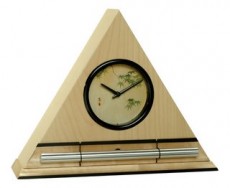 Now & Zen Showroom, Boulder, CO If you do nothing to disturb this “freshly awakened” state while you repeat your affirmation to yourself, you will maximize the effectiveness of the affirmation through this alfa wave programming technique. Like the dreamwork techniques discussed above, the improvement of your life through affirmations in the alpha state can be accomplished without the use of Zen Clocks; but using the progressive alarm clock makes the process easier and more fun.
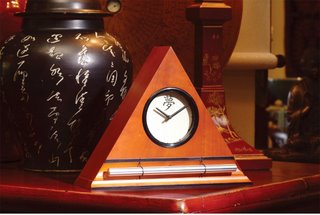 Zen Clocks with Chimes Now & Zen Inc. – The Zen Alarm Clock Store
1638 Pearl St.
Boulder, CO 80302
Posted in Natural Awakening, Now & Zen Alarm Clocks
 Takaragawa Onsen in Japan 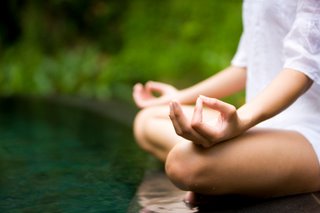 Practice Mindfulness at an Onsen An onsen is a term for hot springs in the Japanese language, though the term is often used to describe the bathing facilities and inns around the hot springs. As a volcanically active country, Japan has thousands of onsen scattered along its length and breadth.
Onsen come in many types and shapes, including outdoor and indoor baths. Baths may be either public run by a municipality or private often run as part of a hotel, ryokan or Bed and Breakfast.
 Ten Thousand Waves in Santa Fe, NM Onsen are a central feature of Japanese tourism often found out in the countryside but there are a number of popular establishments still found within major cities. They are a major tourist attraction drawing Japanese couples, families or company groups who want to get away from the hectic life of the city to relax. Japanese often talk of the virtues of “naked communion” for breaking down barriers and getting to know people in the relaxed homey atmosphere of a ryokan with an attached onsen.
The presence of an onsen is often indicated on signs and maps by a kanji, (yu, meaning “hot water”).
One of Now & Zen’s favorite Japanese onsen is called Ten Thousand Waves, located in the mountains of Santa Fe, New Mexico.
 Taking time to view the Koi fish at Ten Thousand Waves Onsen In the larger scheme of things, our days on this planet are few and precious, so it seems fitting that we should begin each day with grace and beauty. Used as an alarm clock, your Zen Clock thus serves as a useful reminder that each day is a new and sacred opportunity to live life to its fullest. But in addition to its use as an alarm clock, your Zen Timepiece is also an aesthetically-sophisticated timer that enhances practice activities and social gatherings. It can also serve as a “mindfulness bell” that periodically calls you to stillness.
We often bring our Digital Zen Timer with us as a ‘Travel Alarm Clock’ when we go on a journey so that we can use it to meditate in a lovely hot spring like Ten Thousand Waves.
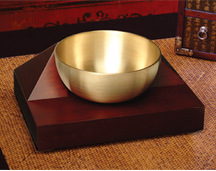 Meditation Timer with Singing Bowl
However, our Zen Timepiece’s acoustic 6-inch brass bowl-gong clock is the world’s ultimate alarm clock, practice timer, and “mindfulness bell.”
Now & Zen’s Meditation Timer Store
1638 Pearl St.
Boulder, CO 80302
(800) 779-6383
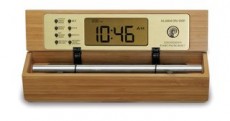 Timer in Bamboo by Now & Zen, Boulder, CO
Posted in Chime Alarm Clocks, Hot Springs, Japanese Inspired Zen Clocks, Meditation Timers, Meditation Tools, Now & Zen Alarm Clocks, Truth, Zen Timers
 Soothe your little sweetie with a gentle massage Empirical research suggests our appreciation of massage starts early—as tastes go, it’s one that needs little acquiring. That’s certainly the message behind the growing trend of infant massage, where mothers and fathers (and sometimes caretakers) bond with their wee ones through loving touch and improve their overall health. Parents, nurses, and doctors say that massage helps babies grow better, improves digestion, and eases colic. Studies conducted at the Touch Research Institutes at the University of Miami School of Medicine show that infant massage facilitates weight gain in preterm infants, decreases babies’ level of stress hormones, and balances out their sleep/wake cycle. “Nurturing touch is important for children’s physical, social, behavioral, mental, and cognitive development,” says Linda Garofallou, an infant and pediatric massage therapist at Children’s Hospital in Newark, New Jersey. She gives infant massage to patients and also trains others in the technique.
To do an infant massage, choose a time when your baby is well fed and rested. Set your Zen Timer for twenty minutes. Put a towel in a quiet room for the baby to lie on, choose a natural oil such as coconut, almond, or avocado, and play relaxing music. Assess the baby’s receptivity by observing her response to your touch. If she is stiff or tense, then use your intuition: either hold her closely in your arms until she relaxes—or wait for another time. A gazing, quiet, yet alert state means she is ready to begin.
 Mom and baby A common stroke, called Indian Milking, entails holding one foot with your hand and then “milking” the leg from the ankle to thigh. Follow this by holding the thigh with both hands and gently twisting and squeezing your hands as you move from thigh to foot. (For more strokes, see Vimala Schneider’s classic book, Infant Massage: A Handbook for Loving Parents [Bantam, 1989] or visit the International Association of Infant Massage, www.iaim.ws/home.html, to find a certified infant massage instructor near you.)
Babes aren’t the only ones who benefit from infant massage. Experts like Andrea Kelly, ceo of the International Association of Infant Massage in Ventura, California say that giving a massage releases nurturing hormones for both the mother (oxytocin) and the father (prolactin).
In addition to bonding, infant massage helps kids born with addictions or serious health problems, says Joanne Starr, MD, director of pediatric cardiothoracic surgery at Children’s Hospital. She’s seen the positive effects of Garofallou’s infant massage on the tiny heart patients she’s operated on. “I think it’s a very important part of their healing,” says Starr, who adds that many of these infants can’t be held because they are hooked up to ventilators. “It’s such a helpless feeling for the parents, but massage empowers them to do something.”
adapted from Natural Solutions Magazine, October 2007
Although meditation can be done in almost any context, practitioners usually employ a quiet, tranquil space, a meditation cushion or bench, and some kind of timing device to time the meditation session. Ideally, the more these accoutrements can be integrated the better. Thus, it is conducive to a satisfying meditation practice to have a timer or clock that is tranquil and beautiful. Using a kitchen timer or beeper watch is less than ideal.
And it was with these considerations in mind that we designed our digital Zen Alarm Clock and practice timer. This unique “Zen Clock” features a long-resonating acoustic chime that brings the meditation session to a gradual close, preserving the environment of stillness while also acting as an effective time signal.
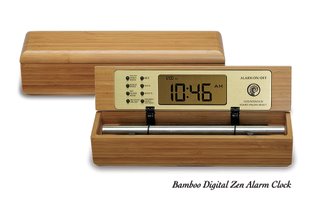 Bamboo Digital Chime Clock, a calming timer and alarm clock made from natural materials like bamboo, walnut, and maple Now & Zen – The Zen Timer Store
1638 Pearl Street
Boulder, CO 80302
(800) 779-6383
Posted in Bamboo Chime Clocks, mindfulness practice, Now & Zen Alarm Clocks, Well-being, Zen Timepiece by Now & Zen, Zen Timers
 Flower of Life The Zen Timepiece can also be more actively incorporated into your meditation practice as a form of “mantra” or “yantra.” Mantra is a sanskrit word which means “mental protection.” In Eastern meditation traditions, a mantra takes the form of a word or sound which is chanted to occupy the mind and keep disturbing thoughts from distracting the meditator. A yantra is used in Eastern meditation traditions as an image upon which the meditator concentrates until it “disappears.”
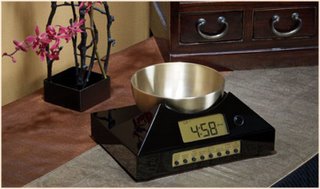 Zen Timepiece by Now & Zen, Boulder, CO The Zen Timepiece’s bowl strikes can be used as a sort of external mantra or sonic yantra. The clock’s countdown mode repeat function (the interval timer) allows the bowl to be struck repeatedly at any set period, so that as the strikes repeat, they serve to bring you back to the focal point of concentration.
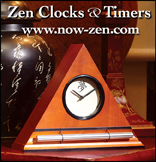 Now & Zen's Meditation Timers and Alarm Clocks Now & Zen’ s Meditation Timer Store
1638 Pearl Street
Boulder, CO 80302
(800) 779-6383
Posted in Chime Alarm Clocks, Meditation Timers, Meditation Tools, Now & Zen Alarm Clocks, Truth, Zen Timepiece by Now & Zen, Zen Timers
 Yoga Pose At the end of a jam-packed day, you finally arrive home — exhausted. But with your mind still abuzz, rest seems impossible.
When your brain gets stuck in high gear, wind down with a simple seated twist, suggests Jasmine Tarkeshi, cofounder of Laughing Lotus Yoga Center in New York City and San Francisco.
“With this move, you fully tense up and release your muscles before twisting,” says Tarkeshi. “The combination wrings out both physical and mental stress. With your mind and body now free from the day’s tensions, you’re ready to enjoy a relaxing evening and a good night’s sleep.”
Seated Twist
What It Does
Cleanses the body of negative, wound-up energy; rejuvenates and calms the nervous system; relaxes the back muscles, spine, shoulders, neck, and hips.
How To Do It
1. Sit cross-legged and place a blanket under your hips for support. Breathe slowly and deeply through your nose. Inhale for a count of four, then exhale for a count of four. Set your Zen Yoga Timer to repeatedly chime every 30 seconds. Continue the exercise 12 times.
2. Inhale and tense all your muscles, from your face to your feet, then bring your shoulders up to your ears. Exhale through your mouth, release muscles, drop shoulders, and stick out your tongue (optional), letting go of all anxiety and stress. Feel your sit bones sinking into the floor.
3. On your next inhale, reach your arms above your head, lengthening your spine. Exhale and twist to the right as you bring your arms down, placing your left hand on the outside of your right knee and your right arm behind you, with fingertips on the floor for support. Turn your head to gaze back over your right shoulder.
4. Stay in this twist for 3 to 5 breaths. Imagine your spine lengthening; each time you exhale, twist a bit deeper.
5. On an inhale, extend your arms back up to the ceiling as you come through the center, then exhale into the twist on the left side. Stay for 3 to 5 breaths, again twisting more deeply with each exhale. Come back to center, reaching upward, and repeat the process on each side two more times.
Adapted from Body + Soul, by Jill Russell
Use our unique “Zen Clock” which functions as a Yoga Timer. It features a long-resonating acoustic chime that brings your meditation or yoga session to a gradual close, preserving the environment of stillness while also acting as an effective time signal. Our Yoga Timer & Clock can be programmed to chime at the end of the meditation or yoga session or periodically throughout the session as a kind of sonic yantra. The beauty and functionality of the Zen Clock/Timer makes it a meditation tool that can actually help you “make time” for meditation in your life. Bring yourself back to balance.
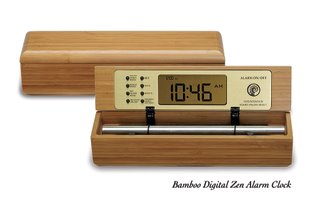 Bamboo Zen Chime Clocks & Timers Now & Zen – The Yoga Timer Store
1638 Pearl Street
Boulder, CO 80302
(800) 779-6383
Posted in Bamboo Chime Clocks, Now & Zen Alarm Clocks, Well-being, Yoga Timer, Yoga Timers by Now & Zen
 Meditation Using a magnetic resonance imaging (MRI) machine, Eileen Luders, a re-searcher in the Department of Neurology at the University of California Los Angeles School of Medicine, looks for evidence that meditation changes the physical structure of the brain. Until recently, this idea would have seemed absurd. “Scientists used to believe that the brain reaches its peak in adulthood and doesn’t change—until it starts to decrease in late adulthood,” Luders says. “Today we know that everything we do, and every experience we have, actually changes the brain.” Indeed, Luders finds several differences between the brains of meditators and nonmeditators. In a study published in the journal NeuroImage in 2009, Luders and her colleagues compared the brains of 22 meditators and 22 age-matched nonmeditators and found that the meditators (who practiced a wide range of traditions and had between 5 and 46 years of meditation experience) had more gray matter in re-gions of the brain that are important for attention, emotion regulation, and mental flexibility. Increased gray matter typically makes an area of the brain more efficient or powerful at processing information. Luders believes that the increased gray matter in the meditators’ brains should make them better at controlling their attention, managing their emotions, and making mindful choices.
Why are there differences between the brains of meditators and nonmeditators? It’s a simple matter of training. Neuroscientists now know that the brain you have today is, in part, a reflection of the demands you have placed on it. People learning to juggle, for example, develop more connections in areas of the brain that anticipate moving objects. Medical students undergoing periods of intense learning show similar changes in the hippocampus, an area of the brain important for memory. And mathematicians have more gray matter in regions important for arithmetic and spatial reasoning.
 Meditation Timers and Alarm Clocks - Boulder, CO More and more neuroscientists, like Luders, have started to think that learning to meditate is no different from learning mental skills such as music or math. Like anything else that requires practice, meditation is a training program for the brain. “Regular use may strengthen the connections between neurons and can also make new connections,” Luders explains. “These tiny changes, in thousands of connections, can lead to visible changes in the structure of the brain.” Those structural changes, in turn, create a brain that is better at doing whatever you’ve asked it to do. Musicians’ brains could get better at analyzing and creating music. Mathematicians’ brains may get better at solving problems. What do meditators’ brains get better at doing? This is where it gets interesting: It depends on what kind of meditation they do.
Over the past decade, researchers have found that if you practice focusing attention on your breath or a mantra, the brain will restructure itself to make concentration easier. If you practice calm acceptance during meditation, you will develop a brain that is more resilient to stress. And if you meditate while cultivating feelings of love and compassion, your brain will develop in such a way that you spontaneously feel more connected to others.
Improve Your Attention
New research shows that meditation can help you improve your ability to concentrate in two ways. First, it can make you better at focusing on something specific while ignoring distractions. Second, it can make you more capable of noticing what is happening around you, giving you a fuller perspective on the present moment.
Some of the most fascinating research on how meditation affects attention is being conducted by Antoine Lutz, PhD, an associate scientist at the Waisman Laboratory for Brain Imaging and Behavior at the University of Wisconsin at Madison, in collaboration with Richard Davidson and the Laboratory for Affective Neuroscience at the University of Wisconsin. Their work has shown that concentration meditation, in which the meditator focuses complete attention on one thing, such as counting the breath or gazing at an object, activates regions of the brain that are critical for controlling attention. This is true even among novice meditators who receive only brief training. Experienced meditators show even stronger activation in these regions. This you would expect, if meditation trains the brain to pay attention. But extremely experienced meditators (who have more than 44,000 hours of meditation practice) show less activation in these regions, even though their performance on attention tasks is better. The explanation for this, in Lutz’s view, is that the meditation training can eventually help reduce the effort it takes to focus your attention. “This would be consistent with traditional accounts of progress in meditation practice. Sustaining focus becomes effortless,” Lutz says. This suggests that people can immediately enhance concentration by learning a simple meditation technique, and that practice creates even more progress.
The researchers also looked at whether vipassana meditation training can improve overall attention. (Vipassana means “to see things as they really are,” and the meditation techniques are designed to increase focus, awareness, and insight.) Researchers label our inability to notice things in our environment as “attentional blink.” Most of us experience this throughout the day, when we become so caught up in our own thoughts that we miss what a friend says to us and have to ask her to repeat it. A more dramatic example would be a car accident caused by your thinking about a conversation you just had and not noticing that the car in front of you has stopped. If you were able to reduce your attentional blink, it would mean a more accurate and complete perception of reality—you would notice more and miss less.
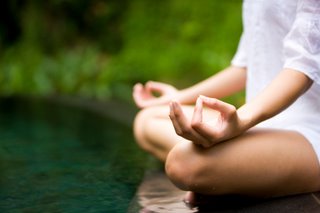 Time Your Meditation With A Zen Timepiece with Tibetan Singing Bowl To test whether meditation reduces attentional blink, participants had to notice two things occurring in rapid succession, less than a second apart. The findings, published in PLoS Biology, reveal that the meditation training improved the participants’ ability to notice both changes, with no loss in accuracy.
What explained this improvement? EEG recordings—which track patterns of electrical activity in the brain, showing precise moment-by-moment fluctuations in brain activation—showed that the participants allocated fewer brain resources to the task of noticing each target. In fact, the meditators spent less mental energy no-ticing the first target, which freed up mental bandwidth for noticing what came next. Paying attention literally became easier for the brain.
As a result, Lutz and his colleagues be-lieve that meditation may increase our control over our limited brain resources. To anyone who knows what it’s like to feel scattered or overwhelmed, this is an ap-pealing benefit indeed. Even though your attention is a limited resource, you can learn to do more with the mental energy you already have.
Our Zen Timepiece’s acoustic 6-inch brass bowl-gong clock is the world’s ultimate alarm clock, practice timer, and “mindfulness bell.” It fills your environment with beautifully complex tones whenever it strikes. In the morning, its exquisite sounds summon your consciousness into awakening with a series of subtle gongs that provide an elegant beginning to your day. Once you experience the Zen Timepiece’s progressive awakening, you’ll never want to wake up any other way. It also serves as the perfect meditation timer.
adapted from Yoga Journal, by Kelly McGonigal
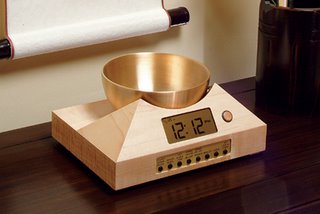 - Meditation Timers and Gentle Alarm Clocks
Now & Zen’s Meditation Timer Shop
1638 Pearl Street
Boulder, CO 80302
(800) 779-6383
Posted in intention, Meditation Timers, Meditation Tools, mindfulness practice, Now & Zen Alarm Clocks, zen, Zen Timers
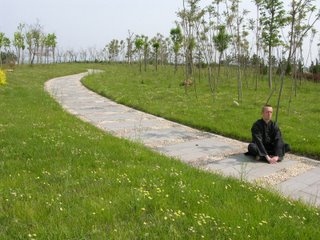 downtime I’m not great with downtime. In line at the post office, I whip out my cell phone and delete old text messages. When I’m stopped at a light, I retrieve a cloth from the glove compartment and dust the dashboard.
At home, I try to snuggle with my pug and relax, but I can’t. I get up to unload the dishwasher, check my e-mail, sort socks, or get a jump on tomorrow’s research and writing. Clearly, I feel better ticking items off my to-do list. The question is: Would I be better off just letting my mind drift?
Truth is, the urge to occupy idle time is tough to fight. We’re a nation of doers, after all: bustling workaholics who have a hard time sitting still (unless it’s in front of the TV). As much as we try to crowd it out, however, experts tell us that boredom is an essential part of the human experience. It’s a counterbalance to all that busyness. In fact, some argue it’s a gateway to peace.
“Create space in your life,” says Body+Soul life coach Cheryl Richardson, “and you’ll find serenity and inspiration on the other side.”
If a little thumb-twiddling can truly lead to better things, why do many of us so desperately avoid it? To demystify our aversion to idleness, we asked Richardson and psychotherapist Richard Winter, M.D., to explain what’s fueling our discomfort with those frightfully unscheduled moments. Here, they share the top three reasons we’re so down on downtime, as well as offer up ways to embrace it — and find deeper satisfaction in the everyday.
We’re Overstimulated
Remember when the doctor’s waiting room was just that — a place to sit, with nothing to do but wait? Now, with TV screens popping up in medical offices, taxicabs, elevators, and even the checkout line (not to mention the lure of your cell phone, iPod, and BlackBerry), every spare moment provides another opportunity for stimulation. As a result, the empty pockets of time we once took for granted have vanished.
 schedule downtime The problem with overstimulation, says Winter, author of “Still Bored in a Culture of Entertainment,” is it creates a “psychological callus” that hardens over time and can eventually keep us from responding with depth to anything or anyone. “Because we can’t discriminate between so many options, we completely shut down our attention to almost everything.”
That, he argues, essentially leaves us feeling passive and craving temporary relief from boredom. Worse, we end up with no time to reflect on our lives, making it harder to forge meaningful connections with the people around us.
Find joy in the humdrum. Recharge your inner resources by reacquainting yourself with quiet. This can prove surprisingly hard if you’re used to nonstop stimulation, so aim for specific actions. Turn off the TV after a certain time each evening. Drive one way of your commute without listening to NPR.
Better still, take a calming walk three nights a week after dinner — and leave the iPod home. The physical activity will satisfy your need to do something, all while energizing you in a way that watching Law & Order can’t. By welcoming a little idle time and its attendant reflection, says Winter, you’ll soon come to “delight in the ordinary again.”
adapted from Body + Soul October 2008
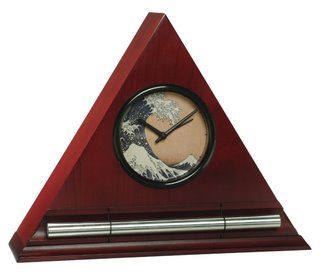 Zen Clock for Timing your downtime with a gentle chime Now & Zen’s Alarm Clock Shop
1638 Pearl Street
Boulder, CO 80302
(800) 779-6383
Posted in intention, Meditation Timers, Meditation Tools, mindfulness practice, nature, Now & Zen Alarm Clocks, Walking Meditation, Well-being, Zen Timepiece by Now & Zen, Zen Timers
 How to Create Instant Calm A healing art based in traditional Chinese medicine, acupressure involves pressing specific points on your body to release muscle tension and stimulate circulation and the flow of qi, or life energy. Two points on the back of your neck known as the “gates of the mind” can ease stress and clear your mind, says Dr. Michael Reed Gach, founder of the Acupressure Institute in Berkeley, California, and producer of the guided self-care DVD “Acupressure for Stress Relief.” As an added bonus, he adds, pressing these points can stop headaches from developing.
Tilt your head back and place your thumbs at the top of your neck, just below the base of your skull, about three inches apart. Press these spots firmly but gently. “You don’t want to press on the skull, but just underneath it,” Gach says. “If your thumbs are weak or arthritic, use your knuckles instead.” As you press, take three to five slow, deep breaths. Finish by letting your hands float into your lap and your chin drop to your chest. Take an additional deep breath, and briefly scan your body to see how you feel. You can repeat this three times, set your Zen Chime Timer so that it repeats every ten seconds so that you can time your breathing.
adapted from Body + Soul July/August 2006
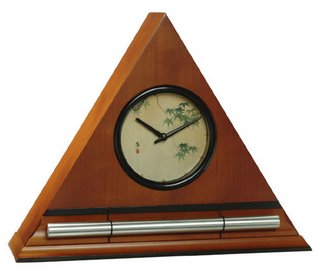 wake up alarm clocks with chimes Now & Zen’s Chime Meditation Timer Store
1638 Pearl Street
Boulder, CO 80302
(800) 779-6383
Posted in intention, mindfulness practice, Now & Zen Alarm Clocks, wake up alarm clock, Well-being
« Previous Page — « Previous Entries
Next Entries » — Next Page »
|
|
|
|